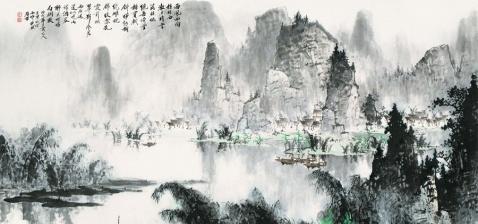Provincial trial Xiangling Drum Ser
Good drum cloud and Ser, often heard of the emperor's spirit.
Feng Yikong danced by himself, and Chu Ke was unbearable.
Bitter tune miserable golden stone, clear sound into the meditation.
Cang Wu came to complain, and Bai Zhi moved Fangxin.
The flowing water spreads to Xiaopu, and the sad wind passes through the cave court.
Qu finally disappeared, and several peaks on the river were green.
--Don Qianqi

Qian Qi, the character Zhongwen, Tianbao Ten Years Jinshi, together with nine other people, was called "Ten Talents of the Great Calendar". The poem is on a par with Liu Changqing, and is called "Qian Liu", and is also called "Qian Lang" with Lang Shiyuan. This poem was made when he went to Beijing to take the entrance examination, and because the question, content and rhyme were limited during the examination, there were very few places for poets to play, so it was rare to see a masterpiece. However, under such harsh circumstances, Qian Qi wrote such a famous poem that has been passed down through the ages, and also laid his position in the poetry world.
When Qian Qi was younger, he was relatively poor, and when he went to Chang'an to take the imperial examination, he lived in a small hotel in Jingkou (Zhenjiang) halfway. Probably because he had not eaten enough for dinner, he was still walking in the courtyard in the middle of the night, when he suddenly heard a person's voice outside the wall: "Qu finally disappeared, and there are several peaks on the river." "Are there any peers who are as hungry as themselves and can't sleep?" He pondered and went out to see. As a result, the moon outside the door was like frost, and there was nothing. He had just turned back, and the voice sounded again, and there was still no one around. If this sound was as far away as it was near, long and short, Qian Qi's face became pale, knowing that he had encountered a ghost, he quickly ran back to the room and shivered in the quilt.
When he went to Beijing and entered the examination room, the title of the examination was "Xiangling Drum ser". "Xiangling Drum Ser", excerpted from the poem "Make the Xiangling Drum sergeant, Make the Sea Dance Feng Yi", contains a beautiful legend - Emperor Shun was buried in Cangwu Mountain after his death, and his concubine committed suicide by throwing herself into Xiangshui because of her grief, becoming the goddess of Xiangshui; she often drummed at the river and expressed her mourning in a serpent.
Faced with such a topic, Qian Qi was inspired, and immediately wrote down five rhymes and ten sentences. The gist is that the Xiangjiang goddess drum is very good, and what water gods, guests, trees, flowers and plants are all shaken and shaky. Where did the Xiangjiang Goddess go in the end? The money couldn't help but get stuck. At this time, he suddenly remembered the collision with the ghost, so he appended the two verses at the end: I don't know where she went, patronizing and listening to music, and when he looked up, he saw only a few peaks on the river side. When the chief examiner Li Wei saw this poem, especially the last two sentences, he couldn't help but be greatly appreciative: "This must be helped by the gods and immortals!" "I was admitted to the highest rank."
The Old Book of Tang and the Biography of Qian Zheng says that these ten words are derived from "ghost ballads", in fact, it is nothing more than saying that these two poems are the divine strokes of Qian Qi, and there is no such thing as a ghost god in this world. Although Qu Finale is irrelevant to Jiang Shang Fengqing, these two images can convey a poignant and calm emotion, so they can be reconciled, if you only say "Qu Finally no one is seen" and no "Jiang Shang Feng Qing", or "Jiang Shang Feng Qing" without "Qu Final People Don't See", the meaning is so obvious.
"Qu finally disappears" shows the disappearance, and "several peaks on the river" expresses eternity. Although the cute music and musicians have disappeared, the green mountains are as majestic as ever, and we can always put our mood on it. In the end, people are afraid of desolation and demand a partner. At the end of the song, the people are gone, and the world we used to travel to suddenly seems to collapse from the bottom of our feet. This is the most embarrassing thing in life, but in the blink of an eye we see Qingfeng on the river, as if we have found another amiable partner, another world of support, and it will always be there. "Mountains and rivers are doubtful and there is no way, willows are dark and flowers are bright and another village", this flavor is similar.
As for the image of "Xiangling Drums" used by later famous poets such as Su Dongpo, Qin Shaoyou and others, there were almost no people who did not use this poem as a model, but they actually forgot its earlier source, "Chu Ci". Because the meaning of those sentences of later people has a lot to do with the ethereal meaning of "Qu finally disappears, and there are several peaks on the river", rather than the imagery in "Chu Ci Long Journey". And this, can not help but be said to be a rather peculiar phenomenon of cultural inheritance, right?